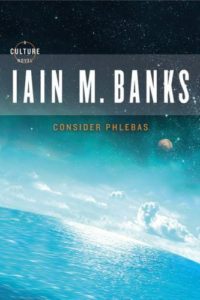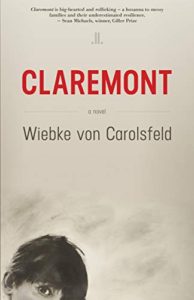When I was in my teens and twenties, I read almost exclusively science fiction and fantasy. I made a conscious effort to broaden my reading tastes, and started reading more literary fiction and less genre, but even then I found my favorite books tended to have some magical realism or speculative angle to them. This year I decided I was going to embrace my favorite genres again, and with recommendations from my sci fic loving friends, dive back into science fiction
 #8 – Consider Phlebas by Iain M. Banks – Consider Phlebas, written in 1987, was the start of Iain M. Banks Culture series, about a society of humanoids and artificial intelligences who practice an intergalactic socialism that is fairy utopian to those who are a part of it. Interestingly enough, those who are familiar with Star Trek’s prime directive, to not interfere with alien cultures that they encounter might be appalled with The Cultures behavior of actively adjusting cultures to improve their evolutionary progress. This first novel in the series takes place about 9,000 years after the formation of the Culture, towards the end of a decades long war with the powerful, faith-driven Idirans. Add a mysterious race of beings known as Changers, and you can see Banks’ strength lies in his world-building, and there are some pretty impressive ideas being tossed around in this novel.
#8 – Consider Phlebas by Iain M. Banks – Consider Phlebas, written in 1987, was the start of Iain M. Banks Culture series, about a society of humanoids and artificial intelligences who practice an intergalactic socialism that is fairy utopian to those who are a part of it. Interestingly enough, those who are familiar with Star Trek’s prime directive, to not interfere with alien cultures that they encounter might be appalled with The Cultures behavior of actively adjusting cultures to improve their evolutionary progress. This first novel in the series takes place about 9,000 years after the formation of the Culture, towards the end of a decades long war with the powerful, faith-driven Idirans. Add a mysterious race of beings known as Changers, and you can see Banks’ strength lies in his world-building, and there are some pretty impressive ideas being tossed around in this novel.
Strangely enough, while I found the book compelling, and the world-building fascinating and top-notch, I was a little less interested in the actual protagonists of the story; particularly, our main character, the Changer knowns as Horza. Not actually an anti-hero, he wasn’t particularly likable, which made him an interesting choice to be the focus of the story. I was also less than impressed by Banks’ handling of the female characters; although there were some interesting observations. There are also some extended sequences that go on for chapters, that probably take up about 5 – 10 minutes of real time. Again, compelling to read, but curious as to the level of detail that would come in at times, while other areas, like characterization, often suffered. It might be interesting to read some other books from The Culture series.
 #7 – Claremont by Wiebke von Carolsfeld – Claremont is a tough book, and it’s a tough book for me to review because I know Wiebke very well, and admire her for her many talents. And while there was a whole lot I really found compelling and powerful in this novel, I found it a bumpy ride that left me pondering certain decisions at times.
#7 – Claremont by Wiebke von Carolsfeld – Claremont is a tough book, and it’s a tough book for me to review because I know Wiebke very well, and admire her for her many talents. And while there was a whole lot I really found compelling and powerful in this novel, I found it a bumpy ride that left me pondering certain decisions at times.
Wiebke explores some important themes in her debut novel, through the lens of a harrowing, almost incomprehensible act of violence that sends the lives of an entire family spinning out of control. Control being an operative word, especially for Tom, the nine-year-old boy whose mother is murdered by his father in an act of rage, and whose father then kills himself. All while Tom is in the next room. Tom’s mother, Mona, leaves behind Tom, as well as two sisters and a brother, all of whom feel complicit in this violent ending through their lack of action, or their introduction of the destructive Russell into the family.
Sonya, the oldest sister, is responsible, thoughtful, judgmental, and would give anything to be a mother. Rose, on the other hand, is a bit of a wild-girl-grown-up, a single mom with a teenaged son, and a habit of making poor decisions. Of course, where poor decisions are concerned, younger brother Will is an irresponsible drifter who at 30ish just doesn’t want to grow up. None of them seems particularly suited to take care of Tom when he finds himself orphaned, and all of them are reeling at the death of their sister as well. How this family manages to get through this harrowing period makes propels Claremont along.
And like I said, there’s a lot to like about Claremont. Wiebke is a skilled writer, moving the plot forward briskly with unsentimental, yet non-judgmental prose. She doesn’t pull any punches, and exposes these characters in all their anguish and flawed misery, making poor decision after poor decision. In fact, that’s what made some of Claremont so difficult. It was so damned hard to like any of the characters. We could sympathize, for sure, but I really just wanted someone to make a good decision and stick with it.
At times the narrative seemed to veer away from the core story to focus on other characters that didn’t seem as important, but as the book moved forward, everyone came together again and proved the need for their presence throughout. With distance, I find the book rising in my estimation, as some of my minor quibbles fall away, and overall arch and meaning of the book becomes so much more powerful. Ultimately, despite a few bumps, I really enjoyed Claremont , and if your up for a pretty tough family drama, I urge you to give it a try.
